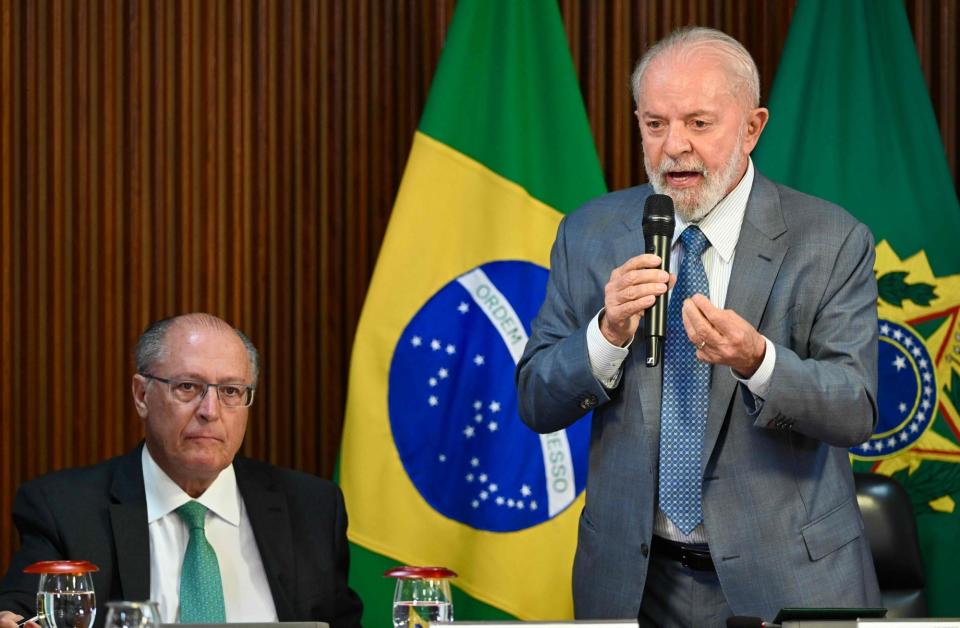After spurning China for years, Brazil reveals plan to join Belt and Road Initiative
Brazil's president revealed on Friday that his administration was putting together "a proposal to join" the Belt and Road Initiative, China's flagship infrastructure and investment project.
Luiz Inacio Lula da Silva shared the news during an event announcing investments by the Brazilian Development Bank to renovate a highway between Rio de Janeiro and Santos, a city 85km (53 miles) from Sao Paulo, site of the country's main port.
Describing a synergy between Chinese interests and Brazil's infrastructure gap, Lula voiced openness to accession as long as it brought tangible results.
Do you have questions about the biggest topics and trends from around the world? Get the answers with SCMP Knowledge, our new platform of curated content with explainers, FAQs, analyses and infographics brought to you by our award-winning team.
"As China wants to discuss this Silk Road [the initiative's former name], we will have to prepare a proposal to assess 'What do we gain? what's in it for Brazil if we participate in this thing?'," he said.
Lula's comments marked the first time the Brazilian government has openly discussed the possibility of joining the scheme, despite China extending several invitations in the past.
Although historically one of the world's largest recipients of mainland investment, Brazil has been reluctant to join the China-centred trade and infrastructure network.
It is one of only three South American countries not taking part in the project, along with Colombia and Paraguay, the latter of which has no formal diplomatic relations with the mainland due to its ties with Taiwan.
The reluctance stems from fears that joining could alienate Western partners and signal an automatic alignment with China.
Diplomats told the Post last year that diplomatic and economic relations between China and Brazil were already robust compared to China and belt and road partners, making the benefits unclear.
In June, the leader of Brazil's ruling party in parliament, Jose Guimaraes, hinted on X (formerly Twitter) that Brazilian Vice-President Geraldo Alckmin was set to "finalise" the country's admission to the initiative during a visit to Beijing.
But Alckmin, who chaired a summit of the Sino-Brazilian High-Level Commission for Consultation and Cooperation alongside Chinese Vice-President Han Zheng, later denied the reports, saying only that the topic would be "on the discussion agenda".

Brazilian President Luiz Inacio Lula da Silva (right) speaks as Vice-President and Minister of Industry and Trade Geraldo Alckmin looks on at the Planalto Palace in Brasilia on May 13, 2024. Photo: AFP alt=Brazilian President Luiz Inacio Lula da Silva (right) speaks as Vice-President and Minister of Industry and Trade Geraldo Alckmin looks on at the Planalto Palace in Brasilia on May 13, 2024. Photo: AFP>
Following these remarks, Liu Jianchao, minister of the Communist Party's International Department, said China "really wants" Brazil to join the trade and infrastructure strategy but had no intention of "setting a deadline".
"It is up to the Brazilian government to decide," Liu told journalists. "We are only stating what benefits the Belt and Road Initiative would bring to China-Brazil cooperation and Brazil's development. But we don't want to impose anything."
Brazil and China this year are celebrating 50 years of bilateral relations, and Chinese President Xi Jinping is expected to attend the G20 summit in Rio de Janeiro in November.
Lula on Thursday stated he would be a guest at the Asia-Pacific Economic Cooperation summit, taking place in Peru in November as well.
China is an Apec member, and Xi is also expected to attend the gathering, during which the deep-sea port of Chancay is slated to be inaugurated. Financed by belt and road funds, the port is meant to expand China's trade volume with South America.
Referring to the Apec summit, Lula said on Thursday it was "the first time Brazil has been invited, and although I don't have much free time, I have already decided that I will go because Brazil wants to enter this 'China world'".
"We need to [understand] how we can integrate into the Pacific from a commercial point of view," the Brazilian president added.
This article originally appeared in the South China Morning Post (SCMP), the most authoritative voice reporting on China and Asia for more than a century. For more SCMP stories, please explore the SCMP app or visit the SCMP's Facebook and Twitter pages. Copyright © 2024 South China Morning Post Publishers Ltd. All rights reserved.
Copyright (c) 2024. South China Morning Post Publishers Ltd. All rights reserved.